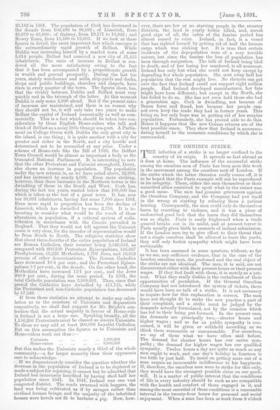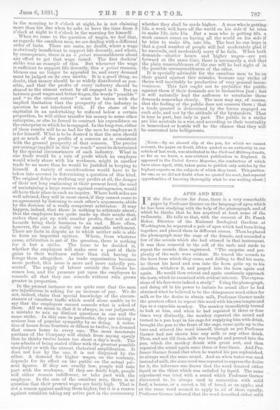THE OMNIBUS STRIKE. T HE infection of a strike is no
longer confined to the country of its origin. It spreads as fast abroad as it does at home. The influence of the successful strike among the omnibus men of Paris has been seen this week in the movement among the omnibus met of London. If the strike which the latter threaten really comes off, it is to be hoped that the Paris example will not be reproduced in its integrity. There, either the men themselves or their uninvited allies contrived to spoil what in the outset was a good cause. The men had genuine grievances against the Omnibus Company, and the Company had put itself in the wrong at starting by refusing them a patient hearing. Consequently, the men could only do themselves harm by resorting to violence, and it was a piece of undeserved good luck that the harm they did themselves was so slight. Paris is easily frightened when a trade quarrel breaks out in its midst, and at present terror in Paris usually gives birth to counsels of instant submission. If the London men try to give effect to their threat that not a single omnibus shall be allowed to leave the yards, they will only forfeit sympathy which might have been serviceable.
It has been assumed in some quarters, without, so far as we see, any sufficient evidence, that in the case of the London omnibus men, the professed and the real object of the strike are not identical. The men, it is said, are not discontented either with their present hours or their present wages. If they find fault with them, it is merely as a pre- text. What they really dislike is the curtailment of their opportunities of peculation. If the General Omnibus Company had not introduced the system of tickets, there would have been no talk of a strike. It is not necessary to inquire how far this explanation is correct. The men have not thought fit to make the new practice a part of their complaint, and a strike must be judged by the demands actually formulated, not by the occasion which has led to their being put forward. In the present case, the demands are principally two,—shorter hours and higher wages ; and so far as public sympathy is con- cerned, it will be given or withheld according as we think them reasonable or unreasonable. For ourselves, we say of them what we have often said before. The demand for shorter hours has our entire sym- pathy; the demand for higher wages has our qualified sympathy. Twelve hours a day are quite as much as any men ought to work, and one day's holiday in fourteen is too little by just half. To insist on getting more out of a man argues an inexcusable indifference to his happiness. If, therefore, the omnibus men were to strike for this only, they would have the strongest posbible claim on our good- will. It is a matter of public interest that the conditions of life in every industry should be such as are compatible with the health and comfort of those engaged in it, and among the most essential of these conditions is a reasonable interval in the twenty-four hours for personal and social enjoyment. When a man has been at work from 8 o'clock in the morning to 8 o'clock at night, he is not claiming more than his due when he asks to have the time from 8 o'clock at night to 8 o'clock in the morning for himself. When we come to the question of wages, we feel that, as regards the omnibus men, we are dealing with a different order of facts. There are cases, no doubt, where a wage is obviously insufficient to support life decently, and where, by consequence, there is an a priori reasonableness about any effort to get that wage raised. The first dockers' strike was an example of this. But whenever the wage is sufficient to support life decently, this a priori reasona- bleness can no loriger be appealed to, and every demand must be judged on its own merits, It is a good thing, no doubt, that money should be as widely distributed as pos- sible, and that the profits of every industry should be shared to the utmost extent by all engaged in it. But as between good wages and better wages, the words " possible " and "to the utmost extent," must be taken with the implied limitation that the prosperity of the industry in question be not interfered with. If the share of the capitalist in an undertaking be reduced below a certain proportion, he will either transfer his money to some other enterprise, or else be forced to contract his expenditure on the enterprise in which he is engaged. In the long-run, either of these results will be as bad for the men he employs as it is for himself. What is to be desired is that the men should get so much of the profits of a concern as is consistent with the general prosperity of that concern. The precise per-centage implied in this "so much" must be determined by the special circumstances of each industry. What in one trade would be a rate of profit which an employer would wisely share with his workmen, might in another trade be no more than he would be justified in keeping to himself. A variety of considerations would have to be taken into account in determining a question of this kind. The original delay in realising any profits at all, the danger of their not long continuing at their present level, the need of maintaining a large reserve against contingencies, would all have their place in such an inquiry. Where both sides are well advised, they will in most cases,if they cannot come to an agreement by listening to each other's arguments, abide by the decision of a really competent arbitrator. It may happen, indeed, that there is nothing to arbitrate about ; that the employers have quite made up their minds that, rather than put up with smaller profits, they will at all hazards bring their business to an end. More often, however, the case is really one for amicable settlement. There are facts in dispute as to which neither side is able to form an impartial opinion. Where, from whatever cause, arbitration is out of the question, there is nothing for it but a strike. The issue to be decided is, whether the employers will make over a part of their gains to •their workmen rather than risk having to forego them altogether. As trade organisation becomes more perfect, this issue is more and more nakedly pre- sented. The supply of labour outside the Unions be- comes less, and the pressure put upon the employers to concede all that they can concede without ruin grows greater in proportion.
In the present instance we are quite sure that the men are injudicious in asking for an increase of pay. We do not, indeed, claim that special knowledge of the circum- stances of omnibus traffic which could alone enable us to say that the employers cannot concede what is asked of them. All we mean is, that it is always, in our judgment, a mistake to mix up distinct questions in one and the same strike. In this ease in particular, they are risking a serious loss of popular sympathy by so doing. A reduc- tion of hours from fourteen or fifteen to twelve, is a demand that comes home to every one. The most inveterate partisan of the Company will shrink from saying openly that he thinks twelve hours too short a day's work. The case admits of being stated either with the greatest possible simplicity or with the utmost rhetorical amplification. It does not lose by the one, it is not disguised by the other. A demand for higher wages, on the contrary, depends for its effect on the public on the actual pre- sent figures. If they are cruelly low, people will take part with the workman. If they are fairly high, people will either remain indifferent, or take part with the employer. In the case of the omnibus men, there is no question that their present wages are fairly high. That is not a reason against making them higher, but it is a reason against outsiders taking any active part in the controversy whether they shall be made higher. A man who is getting 12s. a week will have an the world on his side if he tries to make 12s. into 15s. But a man who is getting 49s. a week cannot count on having all the world on his side if he tries to make 49s. into 56s. The best he can hope is that a, good number of people will feel moderately glad if he succeeds, and moderately sorry if he fails. When both demands—shorter hours and higher wages—are put forward at the same time, there is necessarily a risk that the plain reasonableness of the one will be lost sight of in the possible unreasonableness of the other.
It is specially advisable for the omnibus men to be on their guard against this mistake, because any strike of theirs will inevitably be productive of very general incon- venience. This fact ought not to prejudice the public against them if their demands are in themselves just ; but it will naturally lead the sufferers to scrutinise these demands somewhat closely. The men may say, of course, that the feeling of the public does not concern them ; that a trade quarrel is determined by the forces engaged on each side, and not by the attitude of the bystanders. That is true in part, but only in part. The public in a strike are like neutrals in a war, and according as their neutrality is benevolent or hostile will be the chance that they will be converted into belligerents.







































 Previous page
Previous page